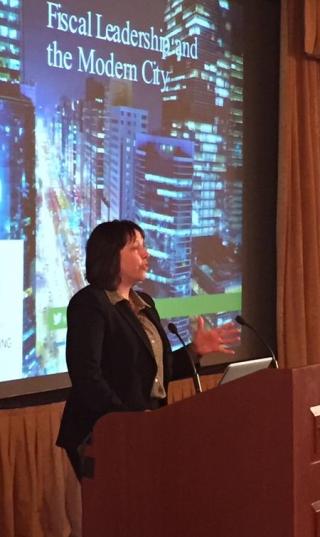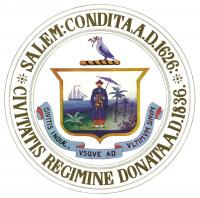Mayor Driscoll Presents Proposed FY2020 City Budget

Below is the letter from Salem Mayor Kim Driscoll to the City Council in submitting the proposed Fiscal Year 2020 budget for the City of Salem and the Salem Public Schools. The complete budget can be found online at www.salem.com/FY20.

May 23, 2019
Ladies and Gentlemen of the Council:
Enclosed please find the proposed FY2020 operating and capital budgets for the City of Salem and the Salem Public Schools. The proposed budgets reflect a balanced and responsible spending plan for our community that continues to invest in the critical quality of life, public infrastructure, and education needs that help make Salem the hub of the North Shore and such an attractive place to live, visit, do business, and raise a family. I believe this budget will continue to strengthen our community and recommend its adoption for the coming fiscal year.
The proposed FY2020 budget grand total is $169,726,502, a change of 4.3% over the FY2019 budget. Fixed costs, such as health insurance, pension and retirement costs, insurance, debt payments, and state assessments, increased by a little more than $3 million for FY2020 and contributed to 43% of the budget change from last fiscal year.
Our schools’ budget will increase by $2,243,232, a change of 3.7%, as we continue our commitment to giving our schools and our teachers the resources that they need to help our children succeed. This does not include school-related costs that appear elsewhere in the budget, such as unemployment costs, debt for school building projects, and so forth.
The enterprise fund budgets (water, sewer, and trash) will increase by $944,396, or 5.5%, due to increases in assessments for these services and the need for infrastructure maintenance and upgrades. Because of the need to invest in our aging water/sewer infrastructure, we are recommending a small increase in water and sewer rates, amounting to a $0.15 change in the residential water rate, a $0.20 change in the commercial water rate, a $0.20 change in the residential sewer rate, and a $0.30 change in the commercial sewer rate.
The FY2020 Capital Improvement Plan (CIP) is also included as part of this budget, as are the associated bond orders for this important plan. I am proud that we instituted a practice of including a forward-looking capital plan in our budget each year as a responsible and transparent way of planning for future obligations while meeting present-day needs to best serve Salem residents.
The inclusion of a CIP and a financial forecast was not standard practice for Salem until I took office in 2006. It is one more way we have professionalized and improved how the City of Salem operates. It is hard to imagine that when I first took office, we walked into a City Hall carrying a $3.5 million deficit from the prior administration. From having nothing in our rainy-day stabilization fund when we took office, we today have over $7 million in that fund thanks to permanent, prudent finance policies that we have worked collectively with the Council to put in place. From having a dismal bond rating, today we have the highest bond rating in our City’s history, for four years running. Five years ago, Salem’s bond rating was upgraded by Standard & Poor’s to AA, the strongest in our City’s history. We have maintained that rating since then and the agency, in their rating report, has stated:
“We view the city’s management as strong, with good financial policies and practices… Salem regularly monitors revenues and expenditures and makes conservative budget assumptions based on a five-year trend. The city council and mayor engage in regular budget surveillance and receive monthly budget-to-actual and investment reports… The city also has a multiyear financial plan that identifies future issues, leading to revenue and expenditure decisions with a long-term perspective. Structural balance is a clear goal in the decision-making process.”
All of these facts are a reflection of our dedication to policies that foster positive economic growth, stable financial management practices, and sustainable and transparent budgeting. Since 2006 we have implemented professional financial management standards and the share of our budget that is our debt payment has been reduced by more than a third. Our general fund debt payment for FY2020 is down 4%, or $310,000, from last year. We have been able to accomplish this by leveraging hundreds of millions in grants, as well as PILOT, SILOT, and other tax agreements, and by being responsible, thoughtful, and prudent with tax dollars.
Not only do our sound fiscal practices ensure public funds are being managed to the highest standards, they also allow us to realize financial gains. Better bond ratings mean we can finance debt at lower interest rates, saving taxpayers money. Over the last few years we were also able to save taxpayers’ dollars through innovations like LED street light conversions, leveraging state grants for rooftop solar to lower electric bills at our schools, electrical aggregation to bring down electricity rates for consumers, and more. Our Sustainability, Energy, and Resiliency Committee has estimated our total annual cost savings from our many energy reduction projects at around $770,00 annually. Equally important, these projects have reduced the City’s carbon emissions by over 3,000 metric tons per year.
In our budgeting practices, the taxpayers of Salem have always been foremost in mind, and FY2020 is no different. This budget both recognizes the impact of property taxes on residents and meets their demands for investments in the local services they need and rely upon every day. We have received the Government Finance Officers Association’s (GFOA) highest accolades for fiscal transparency for the last decade. Salem’s average tax bill change over the last decade has been well below the average for our region and coupled with the adoption of as many exemptions and abatements as practical, particularly focused on our neediest taxpayers, including lower income residents, seniors, veterans, and those living with disabilities.
We have been able to be respectful of taxpayers, while also investing in critical needs. In the FY2020 budget there is an expanded focus on priority areas identified by the administration, the City Council, and residents. These include a more thoughtful approach to maintenance and capital planning for public facilities, investing in critical infrastructure including parks, sidewalks, roadways, trees, and our water/sewer system, a continued focus on addressing our housing challenges, increasing our coordination and preparation for the local impacts of climate change, as well as funding for transportation alternatives reflective of our new transportation enhancement fund. I am confident that working in collaboration with the City Council and community partners we can accomplish these shared goals.
All of these goals, of course, take place in a context of community and financial trends that we must take into consideration. Whether it is housing needs, fears about growth, the opioids epidemic, changing demographics, or a changing climate, our community is facing many challenges that require strategic and sensible leadership. On the financial side, we continue to see the state fail to fully fund their obligations for charter school reimbursements and an unfair PILOT for the South Essex Sewerage District. Rising health care costs are impacting both the public and private sector, and we continue to face the challenge of OPEB and pension liabilities, not to mention costly sick-leave buybacks, agreed to decades ago, but impacting our retirement stabilization fund now.
We have worked hard to tackle these challenges by allocating funds to reserve and stabilization accounts to plan for the future and by taking actions like entering into the Group Insurance Commission, and annually reassessing the cost-effectiveness of that choice. However, the financial challenges presented by these fixed cost centers are still very real and have a real p.
The FY2020 budget projections reflect realistic and conservative assumptions about new lodging excise tax receipts from the increase in the number of hotel rooms in Salem and the expansion of the excise to cover short-term rentals. We also anticipate increased revenues from the changes approved last year by the City Council relative to parking rates, which had previously been unaltered in almost a decade. Lastly, we do anticipate revenues from cannabis excise taxes; however, both DOR and I caution strongly against overly anticipating these revenues, given Salem – and no municipality in the Commonwealth – has yet seen what a full year of this new industry will truly generate in sales and in excise taxes.
The FY2020 budget maintains our dedication to fiscal responsibility while also strengthening our community. I am proud of our collective efforts to limit impacts on Salem taxpayers while also providing much needed services to constituents. This is possible due to our collective attentiveness to City finances, as well as our ongoing efforts at identifying efficiencies in the delivery of services. Our fiscal practices have resulted in not only affirmation of our historic high AA bond rating, but also our regular receipt of recognitions and awards from the GFOA.
Lastly, beyond budgets another key factor in enhancing our local economy is the large number of public and private investments in our community. These developments enhance our short- and long-term economic growth, create much needed housing, add to our tax base, and generate revenues and jobs that improve our overall community. We cannot provide the services and improvements that our constituents rightly demand and deserve, without new growth. Given the reliable increase in fixed costs to the City, a reflexively anti-growth approach to local government is equivalent to endorsing substantial tax increases on Salem homeowners. It is neither fair nor prudent, and we should avoid allowing such a harmful perspective from directing our approach to policy and budgeting. Salem taxpayers deserve better.
In FY2020 we will continue to strive to exceed the service level expectations of our constituents, while simultaneously ensuring fiscal prudency in all expenditures. The mission of City government in Salem is to provide open, honest, and pro-active services effectively and efficiently, focusing on the needs of today, with a vision for the future. In order to accomplish this, the proposed budget aligns operations with short-term and long-term strategic goals and objectives, while maintaining necessary fiscal controls and a careful attention to our financial forecasts in our budgeting. This is a challenging balance to strike, but I believe the proposed budget accomplishes precisely that.
Balancing the City’s budget is no easy task and I appreciate the hard work and cooperation our department heads have put into the preparation of this year’s budget. I cannot say enough about the efforts made by our Finance Department, led by Finance Director Laurie Giardella. The department’s efforts ensured that the budget was ready for submission and in compliance with the high standards we set for ourselves pursuant to GFOA Distinguished Budget guidelines. We are one of only a handful of Massachusetts communities who annually qualify for both a Certificate of Excellence for our Comprehensive Annual Financial Reporting and a Distinguished Budget Presentation Award from the GFOA.
The proposed FY2020 budget represents a strong commitment to the people we are fortunate enough to have been elected to serve. It continues our balanced and responsible approach to city finances and budgets. It invests in continuing to make Salem a vibrant city, a welcoming city, a city with schools in which we can all take pride – in short, a forward-looking and livable city for all. I recommend adoption of the proposed FY2020 budget, CIP, and other associated budgetary Orders and I look forward to working with you in the coming weeks to enact this proposed spending plan in order to continue strengthening and improving our great City.
Sincerely,

Kimberley Driscoll, Mayor
City of Salem

